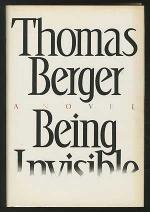|
This section contains 137 words (approx. 1 page at 300 words per page) |

|
The novel is presented primarily in the conventional mode of realism, and more specifically, the urban or metropolitan realism which is Berger's forte. But Berger adds an element of the fantastic—Wagner's ability to make himself invisible. Wagner's handling of this extraordinary gift is adroit; he develops the ability to make all of himself disappear at will, which eliminates some of the problems associated with stories of invisible people through the mechanism of drugs or magic rings. Like J. R. R. Tolkien in The Hobbit (1937; see separate entry), Berger avoids the difficulties of clothes and nudity by making anything that touches Wagner also become invisible. Limiting the fantastic to Wagner's invisibility and the point of view to Wagner's perceptions are important technical choices.
This focus allows Berger to study invisibility as a psychological condition.
|
This section contains 137 words (approx. 1 page at 300 words per page) |

|




